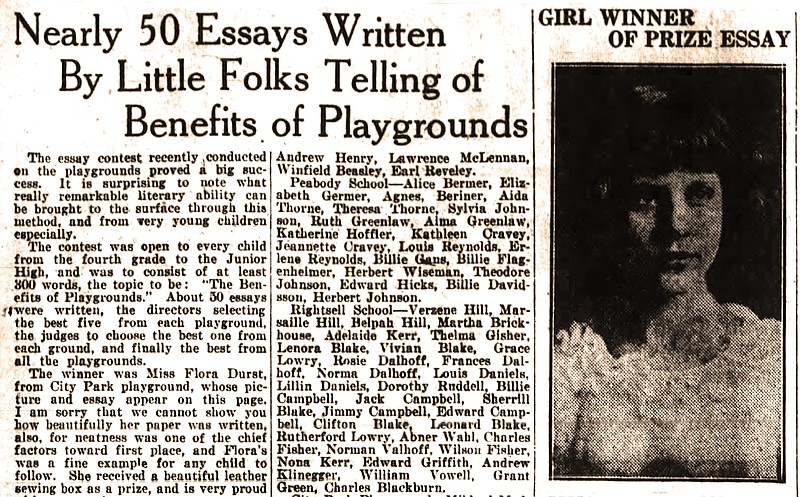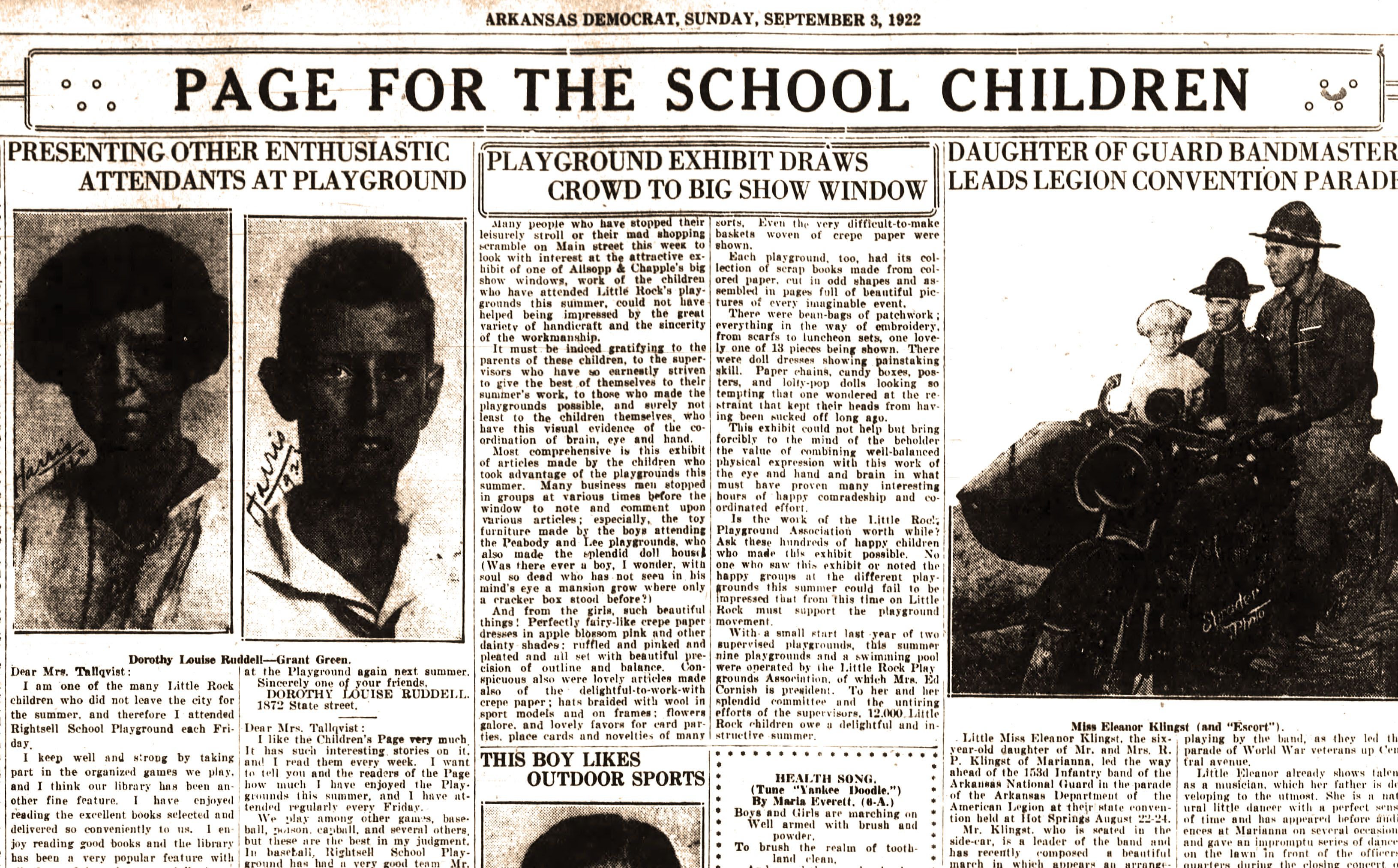Labor Day 1922 was fraught.
Three months earlier, 400,000 railroad shopmen — maintenance crews, including unskilled labor but also electricians and mechanics — walked out of railyards around the nation after being asked to swallow what amounted to a 12% pay cut.
This walkout worsened into the Great Railroad Strike of 1922. People died, as we read here Aug. 15 (see arkansasonline.com/95cops). Apart from how historic it all was, there's not much good to say for it.
But meanwhile, Arkansas children were writing thoroughly kid-like, unimportant stories to the Arkansas Democrat's weekly Page for the School Children.
And so, I ask you, Friend Reader, which would you rather have on this Labor Day — the railway strike? Or kids and their odd little stories?
Let's vote. I'm going to count, and when I reach three, everyone speak clearly into the screen of your iPad which topic you prefer. Say either "strike" or "kids."
OK, here we go. One. Two. Three.
Well! I heard that loud and clear. Kids it is.
THE PAGE FOR SCHOOL CHILDREN
Besides homegrown efforts and school news, the children's page carried syndicated instructional fiction, rhyming poems and a drawing feature.
The editor, Kay Tallqvist (Mrs. K.G. Tallqvist), was deeply in the pocket of the Little Rock Playground Association, which provided "playgrounds," summer-camp-like activities for children around town. In 1922, her page was part of a playgrounds celebration that culminated in a window display at the Allsopp & Chapell bookstore. Tallqvist's part was an essay contest with 50 entries.
I had thought to share the winning essays today, but they read like press releases.
Instead, here's part of an Illinois eighth-grader's poem, sung to the tune of "Row Row Row Your Boat."
Boys and Girls are marching on
Well armed with brush and powder,
To brush the realm of toothland clean,
And sound the warning louder.
Brush the teeth away from gum,
Downward brush the upper;
The lower teeth we must brush up,
Because we know it's proper.
And here's part of "Mary's Pets" by 8-year-old Mary Jane McCarty of 4424 Lee Ave. in Little Rock.
"One morning when Mary had just gotten up and not feeling very much awake had gone into the garden to refresh, she saw a tiny little rabbit close to the hedge, and, slipping quietly up, she caught it. ... After breakfast her brother made a nice little cage for the baby rabbit, and Mary gathered fresh clover, grass, carrots and lettuce, and gave it a bowl of water.
"The rabbit played all day, and ate a little of whatever Mary gave it, but on the second day it would not eat anything, and Mary was quite distressed. On the third morning when Mary took the fresh clover and water to the cage, her little pet was dead, and Mary cried as though her heart would break.
"When her father came to luncheon he promised to buy a tame rabbit for her, because wild ones very seldom live cooped up. He brought her a nice white rabbit with pink eyes, and Mary was very happy, but she gave the poor little wild rabbit a nice funeral and she and the neighboring children sang songs and prayed at the bunny's funeral, and what more could any little bunny have wanted?"
Judging from U.S. Census records, Mary Jane's father George B. McCarty, was — surprise! — a newspaper Linotype operator. She attended four years of high school and became a sales lady, and was still living with her parents in 1940. In 1941, she married Oscar Mercer Mayer of Michigan. After many years, of course, she died. An obituary notice in a Hawaiian paper, the Dec. 11, 1980, Honolulu Adviser, states that the former resident of Hawaii had died in California: "She was an author and artist who taught collage and was active in art therapy."
What more could a little girl want?
■ ■ ■
Before we summarize "The Heroic Sheep Dog" by Lucille Gideon of Gumlog in Pope County, can anybody tell me how the community of Gumlog acquired its name? Was there a gum tree, and was it one day chopped down?
In Lucille's story, a shepherd demands the last full measure of devotion from Shep, a mother dog. With puppies.
"A blizzard was sweeping across the Western plain, the shepherd had gathered his sheep into the fold and after counting them found that three were missing. He went into his cabin, where before the brightly burning fireplace his good sheep dog played with her puppies. The picture of warmth and comfort caused him to shudder with the thought of rousing the dog and sending her to look for the lost sheep."
And yet, he does.
"'Shep, there are three of our providers lost in the storm. I'm not as good as you are, that is the reason why I send you. God will see you through safely. I hate to send you but you must go! Bring back the three sheep.'
"The dog looked up at her kind master, her large brown eyes showing that she understood. She arose and went to her ... puppies and gave each a single lick, a dog's kiss ... the master held the door open, she hesitated as the fierce storm beat against her breast. Yet, true to her breed, she went. Like a streak she ran through the storm and after having watched her until the snow hid her from view, her master went inside and closed the door."
Two hours pass after which Shep returns with two sheep and is allowed to visit her puppies. Then her master says they're going to have to start eating sheep if the storm keeps up, and he doesn't have a sheep to spare. She must find the other one.
Out she goes. After four hours, she's back with the sheep.
The master carries it to the fold, then returns to find Shep stretched out with her puppies. She doesn't look so good. He plops down and commences to sing "Nearer, My God to Thee," apparently, Shep's favorite dance tune because, Lucille says, it usually causes her to stir. But she doesn't, because she is dead.
Master feels so bad he puts fresh flowers on her grave every day -- presumably after the storm ends.
What more could a poor dog want?
■ ■ ■
Ninth-grader Earl Switzer, son of Dr. and Mrs. D.M. Switzer of 419 W. Fifth St. in North Little Rock, wrote a story advocating "Kindness to Animals." It stars a boy named Tom Jones who asks a man at the river what he's doing to a puppy.
"'I am going to drown it,' replied the man, as he tied a big stone to a rope dangling from the dog's neck.
"'Please don't drown him,' replied Tom. 'What has he done to you?'"
The only thing wrong with the dog, says the man, is he kills chickens. So, Tom buys the dog for a quarter and names him Tige. Earl writes, "We will guess how gratified the dog felt."
Flash forward two years. Tom and Tige are boating, and a storm comes along. Tom can't swim, but luckily, Tige "had the good sense and remembered when Tom saved his life." He drags the boy to shore by his collar.
That night Tom says, "Mother, it certainly pays to be kind to dumb animals."
■ ■ ■
I leave you with "Kindness" by Ruth Peacock of Winchester in Drew County.
"Once two boys went hunting for rabbits and squirrels... . They had almost decided to go home when Jack, with a last hope, chanced to look into a hollow tree and what did he find but two baby cubs. He took one and Fred took the other.
"They started home, but the mother of the cubs followed in close pursuit. They won the race, however, and took the bears home to their parents, but their fathers made them take them back to the exact place where they had found them, and there the mother bear sat.
"When she saw the boys putting the cubs back into the tree, she knew that they were friends and rubbed herself against them and hugged them, not too tightly, to show her appreciation.
"After that the boys went every day to see the bears and they all became the best of friends, and the boys were glad that they had made friends with them all and had not broken the mother bear's heart."
Happy Labor Day to you and me and the cute kids our ancestors used to be.
Email:
cstorey@adgnewsroom.com

